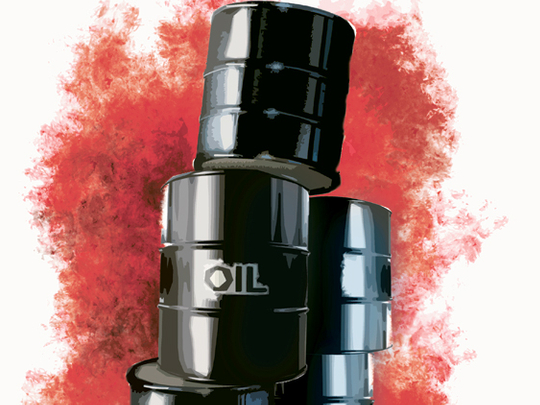
In a nutshell: Iraq needs an oil and gas law badly — right now — but the Iraqi central government and provinces are unable agree on the way to go about signing oil contracts.
I have no doubt that this law will be the glue that holds the country together and prevents it from splintering and collapsing into 100 pieces before everyone's eyes. We don't need or want another Humpty Dumpty in Iraq, as we have had our share of broken hearts and heads over the past 40 plus years.
Why the law has been so long in the making may well be another indicator of the inability of all Iraqi blocs, government entities and provinces to reach a basic agreement about a life-threatening issue.
Why am I calling it a life-threatening issue? Simply because since the start of the 1990 UN sanctions, Iraq ceased to develop in any industrial or agricultural field and became entirely dependent on its oil production. Whoever implies otherwise can easily take a tour around Iraq's market and search for any Iraqi agricultural or industrial product of any sort.
And as Iraq will be the most important oil producer around the globe towards 2035, according to international energy research centres, it is high time to draw the line regarding side dealings and to start focusing on the oil and gas law.
In October, the Kurdish Regional Government signed an agreement with ExxonMobil, the huge American oil company, based on a Kurdish government law that was neither approved nor based on the central Iraqi government's laws and regulations.
New era
As a result Exxon was commissioned to develop oil and gas in six locations in the northern region of Iraq, sadly without the consent of Baghdad.
All this is taking place as the country is on the threshold of a new era, without US troops on the ground.
Some may think that the US is standing behind Exxon as its interests are the same as those of Washington.
However, that is not the case today.
The US State Department said lately that it had warned ExxonMobil and other US firms of the risks of signing contracts in Iraq without nationwide approval, but would not say whether it talked with Exxon before it struck the controversial oil deal in the Kurdistan region.
Because many people see ExxonMobil as an extension of the US State Department, some analysts believe the deal must have been approved by it.
At a media briefing, the State Department denied any knowledge of the Exxon deal and stressed that it did not encourage any oil company to strike deals bilaterally with governorates. The bottom line: deals have to be signed with the central government.
Can anyone seriously blame the Iraqi government for threatening to impose sanctions on any oil company that enters into separate agreements with any Iraqi local government or province?
Baghdad has also announced that ExxonMobil would be excluded from the next round of bidding for further contracts.
This is easier said than done. Exxon is no small fish. However, the Iraqis will act boldly.
"I don't believe that the central government of Iraq will cancel any signed contracts or contracts that are already in place, and particularly a contract with ExxonMobil," Deputy Prime Minister Ross Nouri Shawis said recently in London.
"Generally, there is a majority who want to resolve this problem, but of course there are opposing views, and this is normal with any topic."
Iraqi government spokesman Dr Ali Al Dabbagh he said that the Iraqi Constitution's Article 111 is clear on the ownership of gas and oil, and stipulates that the party responsible for approving contracts is the central federal government.
Exxon silent
Exxon for its part has not commented on the deal or on the threat of cancelling its contract to develop Iraq's 8.7-billion-barrel West Qurna Phase One oilfield in the south.
Royal Dutch Shell has also held talks with the Kurds about potential investments over the past year, several officials and oil executives said.
Had Shell signed the deal to invest in Kurdistan, it could have derailed a $17 billion (Dh62 billion) gas deal with the Baghdad government.
The Kurds argue that the Iraqi constitution allows them to sign oil contracts and say Deputy Prime Minister for Energy Hussain Al Shahristan's objection to the deals reflects opposition to Kurdish autonomy.
Some in Baghdad argue that a decentralised system of oil licensing could be chaotic and lead to a lack of transparency over revenues.
A line has to be drawn somewhere. A comprehensive and applicable oil and hydrocarbon policy and law must be put in place in Iraq.
There have been so many attempts to draft a law since 2006 that expecting one anytime soon is not realistic.
With this law, a semblance of normality will be present in Iraq. Without it, there will be serious consequences.












